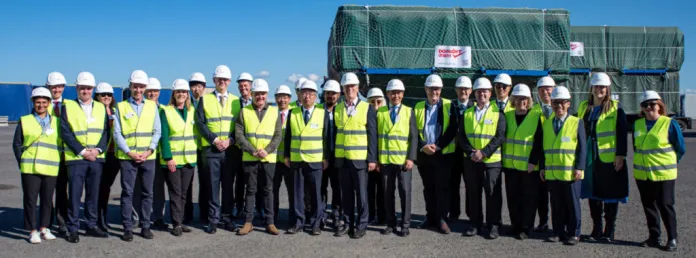Mitsui O.S.K. Lines, Ltd. (MOL) participated in a reception on July 12, organised by the Port of Newcastle (PoN), with the presence of Mr. Chris Bowen, Australia’s Minister of Climate Change and Energy. The purpose of the event was to introduce MOL as the partner for the Clean Energy Precinct construction project, which is now fully operational. PoN, responsible for port management and development in Newcastle, New South Wales, Australia, is renowned as the world’s largest coal exporting port.
In February of this year, MOL and PoN reached a significant milestone by signing a memorandum of understanding (MoU) to collaboratively explore the development and logistics of the designated area. Since May, with the project now in full operation, MOL has actively engaged in joint studies alongside PoN, focusing primarily on ocean transport and bunkering of clean energy within the region.
Notably, this ambitious endeavour has secured substantial support from the Australian federal government, which has allocated $100 million (approximately ¥9.5 billion) in funding. This financial backing will be instrumental in establishing a prominent Clean Energy Precinct within the port area. The precinct will serve as a key hub for the production, storage and export of various clean energy sources, including green hydrogen and ammonia. Moreover, it will play a pivotal role in advancing the cause of decarbonization, fostering a sustainable society and generating local employment opportunities.


With over 300 MOL-operated vessels making annual calls at the Port of Newcastle (PoN), this strategic port hub holds immense geographical significance. As part of MOL’s “BLUE ACTION 2035” management plan, the company has prioritised environmental strategy as a crucial component. In alignment with its “MOL Group Environmental Vision 2.2,” MOL has set an ambitious target of achieving net-zero greenhouse gas (GHG) emissions by 2050.
By actively participating in the PoN’s clean energy construction project, MOL aims to play a pivotal role in establishing a robust clean energy supply chain. This endeavour aligns with the company’s commitment to leveraging its collective strengths and engaging in the clean energy business. MOL seeks to not only reduce GHG emissions within its own operations but also contribute to the broader objective of reducing emissions across society. Through these efforts, MOL is dedicated to proactively addressing significant shifts in energy supply and promoting sustainable practices.




